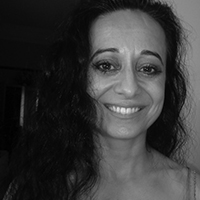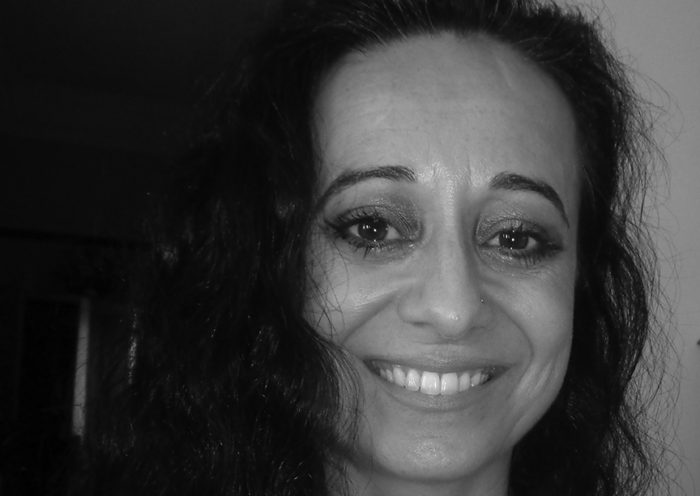The Exorcism of Ecphora
by Annie Blake
I wasn’t sure who kept switching on the lights. The house was supposed to be empty. I waited for him to come home because I needed some reassurance I wasn’t losing my sanity. He came home.
***
But I’m sure I switched off all the lights after everyone left that morning.
***
When I was alone the next day, I could hear footsteps outside my room.
***
The more my ears open, the more my voice shuts down. It’s automatic. Sometimes I become a mute. The steps outside are full of water. Insidious seas. The opening of the door is an apertural view of a shell. But I am like a camera with an aperture stop. My room is heavy with empty.
***
I didn’t want to look at the door. The knob was a potential bomb. But my hands turned and wrung me out anyway. I was under water. Fog can weigh you down under water. Sink you like a rock.
***
I could hear a ship sounding her bells in a storm. The kelp was the only thing alive in the sea. Even the fish were dead—upside down and gummy; sliced palms of haddocks. My hair and the kelp—how land and water marry.
***
I swam through one eye and then walked through the other.
***
Someone has left the light on in the dining room. For fuck’s sake. How many times have I told them to save electricity? I saw Keren approaching the stairs. I forgot he lived here. He looked a little like my son. Sometimes he looked like a native and other times he looked Russian. He didn’t look at me much. He was an introvert. It must have been him. He’s the one opening all the doors. I’ve told him before. He says he’s cold. All he wants is heat.
***
But I was his mother. Too young to know anything about estrus. The mind has a way of adjusting its aperture stop. A room surrounded by curtains susurrating with the floor—a scrambled view like egg battered in a jar. The wind bubbling at their hems—they are stage curtains all around. I’m in the middle—wind around my ankles and my heels—buzzing around like bees.
***
I obsessively worry about four things. I alternate them like the blades of a fan—the gentle suppleness of knives. How they spin through fingers and umbilical cords. How they promise the ooze of overripe summer.
***
When I stop at a red light I notice a line of cars in the rain. The dissonance of their wipers. The sagging rhythm everyone tries to keep in time with. Ridding the windshields of rain.
***
When you lose your ability to distinguish between fantasy and reality, you have nothing else to lose.
***
I told Keren I was an empty offering. The two bells on my body; feeling the firm curvature of fruit; milk of its figs. Here are the divides of our tongues—the longing of their sweet juices. His hands were more bone than fat, for he always ate grainy bread. His hair was as alive as kelp. A regenerative sauna. The body I was in—white and damp on the snow. Feeling the pleats of our moist skins like slithers of consciousness. Like the flash when a photo is taken. When I feel like I’m in a wound that tightens like the waist under a woman’s corset, I know I have to climb up its ribs again. When I feel like I’m in a widening wound like the hips of a rainforest, I know I’m heading the right way.
***
The laces of my dress are ribs. I held him. His breath bathed in the fermentation of fatigue. His fingers were long and could play the piano. His purpose was to evolve beyond onanism. My mother and father taught me to look for bean clams in the sea. Just under the sand. We dig with our fingers. The arperture of his nails—eggy salty pus. Clitorides. Eating raw; the wounds of our eyes.
***
The hair on his hands. The growing fibers of his arms. Fingers looking in the mud. For the twist of the umbilicus—the dark purse of her lips. A borehole. The four costae of the Ecphora. The easy snapping of ribs—the relief of his fingers like the tearing of threadbare fabric. Handfuls of eternal ash. The opening of the dry earth for mouths—the lifting of the gullet. The thawing of white on the field. He cleans the interior of the white buffalo. I learn from the divine licks of his teeth.
***
The bells were ringing to call the child who died. My body was turning over like red meat in the mist. Town criers are ringing their bells to summon me. It is the end of the war and there will be a holy wedding.
***
When children climb into a dry carcass of a buffalo, they must first eat what fills it. Then there will be the adjustment of their bodies inside by the unwinding of their joints. All children need shelter from storms. He scoops out the dust of burnt bodies; the cracked shells of the vase.
***
When children are spoilt with bruised fruit, they will break everything you have.
***
I am still an animal. He still wants me so he crawls inside my craw. He holds onto my entrails for he doesn’t want to feel disconnected. He is heavy. I unlatch my body. His arms outstretch—as well as his legs. Branches instead of switches, to keep me erect like a memento mori photograph. Like a hallway coat stand laden with coats. We can open more doors this way. Keren’s round parts are bulbs. He is growing. I can feel him. He builds a fire in my body for the extrusion of his bones to take place. We rise like the unmistakable mast of a ship. Even in the storm, camisoles are billowing. Lucent—a scintillating lighthouse.
***
I am standing in our body. I am russet. The color of potato when it is pulled from the earth or an Ecphora—my hand that spiders out of the sand. For I come from the earth; from the water first.
***
For posterity’s sake.
***
The ox is ploughing the earth, making furrows in my body with his plow. He made goblets out of his horns.
***
Menstruation is circular. I mistake it for the putrefaction of fish. Sometimes I smell the exploitation of fish at the marketplace. Their high protein content makes my body able. I drink from his horns. He explains they are aphrodisiacs. I eat croissants for breakfast because they look like horns and the croitre of moons. Made of glass. Air. Viennoiseries with laminated dough.
***
I’m sick of sitting in the dough of the unknowables—their knuckles knocking, kick-starting me like the manufactured steel of automobile parts. In grade school, I cried because I didn’t want my mother to leave me. When she left, the teacher took me outside. She told another teacher she was looking for lice.
***
She wasn’t looking for lice. She was pulling my hair.
***
I stopped squalling. Fear and silence hold hands instantaneously. Sometimes the only way to make someone love you is by tip-toeing in their shadow.
***
Walking in front of them is harder than letting yourself hang.
***
Keren swims inside. He pulls the nails out of my hands. I unknit my web because when I was young I wore lace veils to church; a lace dress up to my chin. My finger nail catches on to the lace.
***
She shakes like her gallows. Her legs are her last.
***
It is walking into the fall—the unmasking of our leaves. And feeling this time, I will live to bud. The gentle creak of the doors in the hallway. The lights divulging all my rooms.
***
The pigeon is fixing a nest on my balcony. It was winter— its winds untying its cries like the primitive crimes of animals. It is a large bed I sleep in for he could not bear the crying of newborns.
***
Maybe he carries the cries of his mother. Of himself.
***
I remember my mother’s silver coins splashing like paint against the wall. The cooked spittle of her belly. Simmering; how it curdles into maggots in the sink. I watch while she strains the tubes in her throat.
***
His father’s exquisite concentration of his fingers while loading his gun. Her tuft of red hair—whatever is left under his fingernails. The hot blood-speckled skin of a pecked buffalo. The fur is taken off when the circumference of skin tries to hold the weight of a metal bullet. Blades for a tongue. The licking of blades. Shining silver swords.
***
His hands are sewing me. My father’s noose. His dollar bills and his will—he lets loose from his wrists. His fingers, though work-stained are lissom when tying rope. I am tightening up my daughter’s ballet bun so her wisps of hair are bent back. The elegant twist and overlap of a hair net. A stiff coat of hairspray. She is taught there must be no deviation from the steps she is taught. The rope’s final rip through the well floor. The bucket tapping against the floor—breaking dark red coral.
***
The blood-run snow—welling in the deep wrinkles of her skin.
***
My son tells me I’m so nice now. He asks, Were you angry because when I was small I was bad? We hold each other like red ribbons around a gift. No, I say. It was all about me.
***
I can now throw my voice like a dart.
***
When she awoke her skin was unrippled like she had been sleeping in a glass box. The scales of my shells are opening. I have learnt to break open the clam by unjamming its hinge ligament.
***
Rain is sweetest under the dry fan of eyelashes. On top of the cracked egg of snow. The mouth is a clam. Teeth—a wreath of diamonds. The tongue a live mollusk. My hair—a curtain of herb in the spring air.
***
My body green and sown in the field.
BIO
 Annie Blake is an Australian writer, thinker and researcher. She is a wife and mother of five children. Her main interests include psychoanalysis and metaphysics. She is currently interested in arthouse writing which explores the surreal nature and symbolic meanings of unconscious material through nocturnal and diurnal dreams and fantasies. Her writing is a dialogue between unconscious material and conscious thoughts and synchronicity. You can visit her on annieblakethegatherer.blogspot.com.au and https://www.facebook.com/profile.php?id=100009445206990.
Annie Blake is an Australian writer, thinker and researcher. She is a wife and mother of five children. Her main interests include psychoanalysis and metaphysics. She is currently interested in arthouse writing which explores the surreal nature and symbolic meanings of unconscious material through nocturnal and diurnal dreams and fantasies. Her writing is a dialogue between unconscious material and conscious thoughts and synchronicity. You can visit her on annieblakethegatherer.blogspot.com.au and https://www.facebook.com/profile.php?id=100009445206990.


















